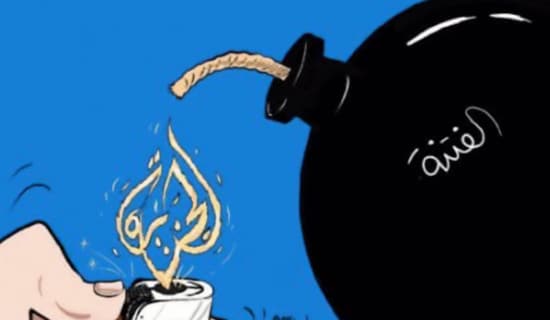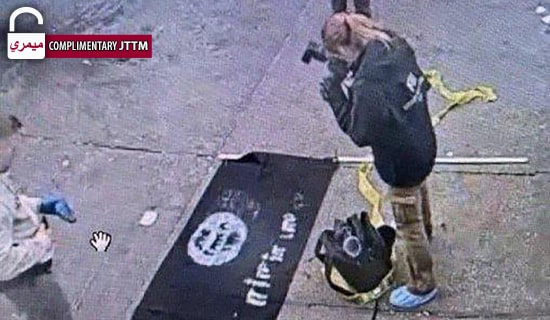In light of growing tensions between Iran and the Arab countries, [1] the Egyptian government daily Al-Ahram published an editorial harshly criticizing Iran and opposing a dialogue with it. The editorial contended that the Iranian regime was trying to escape internal pressures it is currently facing by exporting its domestic crises to the Arab countries and establishing an Iranian hegemony in the region - either through military intervention or by interfering with the media, politics and religion of the Arab countries. It further claimed that considering Iran's positions and conduct, the Arab League member countries must refuse to hold a dialogue with it.
Following are excerpts from the editorial: [2]
"It looks as if the growing internal tensions have prompted the Iranian regime to attempt to export its domestic crises to the Arab countries, as part of [its policy] of imposing an Iranian hegemony upon the region. It is no secret that Iran is facing internal conflicts and a growing popular pressure. The British daily The Guardian has publicized an incident which the Iranian authorities have been trying to hide from the media by every possible means, [namely] an Iranian citizen throwing a shoe [at Iranian President Mahmoud] Ahmadinejad during his recent visit to the city of Orumiyeh. [3]
"This incident shows how strong the internal pressure has become in Iran. Not less important is the [recent] rise in the [number of] acts of oppression [on the part of the Iranian regime] directed against anyone who dares to oppose it, even if this person is himself part of the regime. [Indeed,] bans have been imposed on several newspapers that promote what is called 'the reformist stream,' and a number of its supporters have been arrested. In addition, restrictions have been imposed on the freedom of opinion and expression, to the extent that the Iranian regime has implemented racist measures against the Sunni stream [in Iran]…
"The Iranian regime has resorted to escapism by exporting its internal crises to the Arab countries. This is done [in the following ways]:
- [The activation of] Shi'ite minorities that support [the Iranian regime] in several [Arab] countries.
- Open and direct intervention, including military intervention, as in the case of the occupation of the three UAE islands [Greater Tunb, Lesser Tunb, and Abu Moussa].
- Media pressure through provocative statements by senior officials, which undermine the sovereignty and stability of the Arab countries, e.g., the statement that the Kingdom of Bahrain is not an independent state but Iran's 14th province. [4]
- Political interference in Arab affairs through financing and exploiting some of the Palestinian elements, or through supporting the Polisario front in order to gain a foothold in Morocco. [5]
- Spreading Shi'a in predominantly Sunni Arab countries, which have never experienced an intra-Muslim rift [e.g., Egypt].
"In light of these provocations, it is only natural that there should be continuous tension between Iran and the Arab countries. [This is evident, for example, in] Rabat's announcement of the termination of diplomatic relations with Teheran in response to Iran's inappropriate statements regarding Morocco and attempts to harm the religious identity of the Moroccan people - not to mention supporting the Polisario front.
"Considering the situation, it would be logical for the Arab countries to reject the call for a dialogue with Iran which some pro-Iranian elements have been trying to promote. Such a call, according to the UAE Foreign Minister Sheikh 'Abdallah ben Zayed would be akin to urging the Arab League to hold a dialogue with Israel - since Iran, like Israel, occupies the lands of an Arab country.
"Iran seeks to become part of every Arab and regional enterprise through every available means, in order to impose its hegemony and destroy the foundations of the religion followed by the overwhelming majority of the Arabs. However, its attempts are doomed to failure, since it does not understand that the Arabs will never join a plan aimed at destroying their identity."
Endnotes:
[1] See MEMRI Inquiry and Analysis No. 492, "An Escalating Regional Cold War - Part I: The 2009 Gaza War," by: Y. Carmon, Y. Yehoshua, A. Savyon, and H. Miron, February 2, 2009, An Escalating Regional Cold War – Part I: The 2009 Gaza War ; MEMRI Inquiry and Analysis No. 485, "Rising Inter-Arab Tensions: Saudi Arabia and Egypt versus Syria and Iran, Part I - Deepening Crisis in Saudi-Syrian Relations," by: C. Jacob, December 22, 2008, Rising Inter-Arab Tensions: Saudi Arabia and Egypt versus Syria and Iran Part I – Deepening Crisis in Saudi-Syrian Relations ; MEMRI Inquiry and Analysis No. 479, "Calls in Iran to Topple Egyptian, Saudi Regimes," by: Y. Mansharof,December 12, 2008, http://www.memri.org./bin/articles.cgi?Page=archives&Area=ia&ID=IA47908.
[2] Al-Ahram (Egypt), March 7, 2009.
[3] Al-Sharq Al-Awsat reported that, during Ahmadinejad's visit to Orumiyeh (situated in northwestern Iran) on March 5, 2009, an Iranian citizen threw a shoe at Ahmadinejad's car, and another - a turban. Ahmadinejad's media advisor Ali Akhbar Javanfekr, who did not accompany the Iranian president on this visit, denied the report. Al-Sharq Al-Awsat (London), March 9, 2009; Hammihannews (Iran), March 7, 2009.
[4] During ceremony marking the 30th anniversary of the Islamic Revolution held February 10, 2009, in Mashhad, advisor to the Iranian Supreme Leader Ali Khamenei, Ali Akbar Nateq Nouri, stated that Bahrain is the 14th province of Iran. Khorasan (Iran), February 11, 2009. Several months previously, tensions had developed between Iran and the Gulf states, particularly Bahrain, in the wake of an op-ed by the editor of the Iranian daily Kayhan, Hossein Shariatmadari, who is an associate of Iranian Supreme Leader Ali Khamenei. The op-ed, which depicted the Gulf regimes as "not legitimate" and claimed that Bahrain is an inseparable part of Iran and should be returned to it, provoked angry reactions in the Gulf. See MEMRI Inquiry & Analysis No. 379, "Tension in Iran-Bahrain Relations after Kayhan Editor Claims Bahrain Is Inseparable Part of Iran," By: Y. Mansharof and I. Rapoport, August 3, 2007,
Tension in Iran-Bahrain Relations After Kayhan Editor Claims Bahrain Is Inseparable Part of Iran.
[5] The Polisario Front is a Sahrawi rebel movement fighting for the independence of Western Sahara from Morocco.




